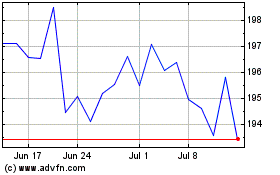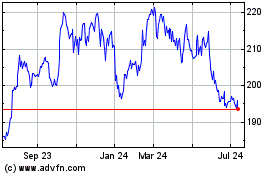UPDATE: NYSE-Deutsche Deal Won't Alter US Futures Landscape - CME
March 08 2011 - 5:00PM
Dow Jones News
CME Group Inc. (CME) remains confident on its home turf as it
confronts a potentially larger competitor in the combined European
derivatives businesses of NYSE Euronext (NYX) and Deutsche Boerse
AG (DB1.XE), a senior CME executive said Tuesday.
CME, the world's largest futures exchange operator by contract
volume, stands to lose that title to a combined NYSE-Deutsche
Boerse that would hold sway over nearly all of European futures and
options linked to key interest rates and stock indexes.
"Putting together their pools of liquidity doesn't really create
significant competitive advantages for them," said Jamie Parisi,
chief financial officer for the Chicago-based exchange company, at
an event hosted by Raymond James.
The NYSE Euronext-Deutsche Boerse deal, announced last month,
would create an entity that traded a combined 3.12 billion European
derivatives contracts in 2010, according to figures from the
Futures Industry Association. CME's total was about 3.08 billion,
with most of its business centered around U.S. trading hours.
A fusion of the biggest U.K. and German derivatives platforms
would mirror CME's 2007 deal to acquire the Chicago Board of Trade,
which brought together dominant slates of U.S. interest-rate,
stock-index and commodity futures markets.
That arrangement improved trading efficiencies for customers,
according to Parisi. Deutsche Boerse's deal with NYSE Euronext will
likely do the same, "but in the end I don't think it really
[improves] their competitive position in selling into the U.S.," he
said.
The proposed merger comes as CME faces the most serious
challenge in years to its core interest-rate futures business from
NYSE Euronext, which has joined up with the Depository Trust &
Clearing Corp. to develop a new clearinghouse to back the strategy.
Over the past decade CME has successfully defended its U.S. turf
against an attempted incursion from Deutsche Boerse's derivatives
arm Eurex, alongside past efforts by NYSE Euronext's U.K. futures
arm to replicate key products.
The new NYSE-backed threat is centered on a cheaper way to
manage futures trading alongside related business in U.S.
government securities like Treasury bonds. The venture prompted CME
last week to respond with its own plan to reduce collateral
requirements, which drew concerns from credit rating agency
Standard & Poor's.
CME also faces tougher competition from the as-yet unnamed
NYSE-Deutsche Boerse group in the race to forge ties with
developing exchange groups around the globe. Duncan Niederauer, the
chief executive of NYSE Euronext who will also lead the combined
entity, said he aims to make the new company the preferred partner
of exchanges in regions like Asia.
Parisi said Tuesday that CME will continue to seek alliances
with local exchanges in developing economies as its chief mode of
global expansion, as opposed to making outright acquisitions, which
can be complicated by local regulations.
"Oftentimes the exchanges are a crown jewel of those economies
and they're not likely to be sold to an outside party," he
said.
The Indonesia Commodity & Derivatives Exchange on Tuesday
voiced interest in opening access to CME's electronic markets,
following a new law allowing the exchange to facilitate local
companies' transactions on overseas markets.
Separately, CME is working to develop activity in its
dollar-based crude palm oil futures by recruiting more traders
during Asian business hours, following on a 2009 deal that saw the
company take a 25% stake in Bursa Malaysia Bhd's (1818.KU)
derivatives unit.
Malaysia and Indonesia, both toiling to promote their
commodities markets to investors, are the two biggest producers of
palm oil and together represent an estimated 85% of global
production.
-By Jacob Bunge, Dow Jones Newswires; 312-750-4117;
jacob.bunge@dowjones.com
CME (NASDAQ:CME)
Historical Stock Chart
From May 2024 to Jun 2024

CME (NASDAQ:CME)
Historical Stock Chart
From Jun 2023 to Jun 2024
